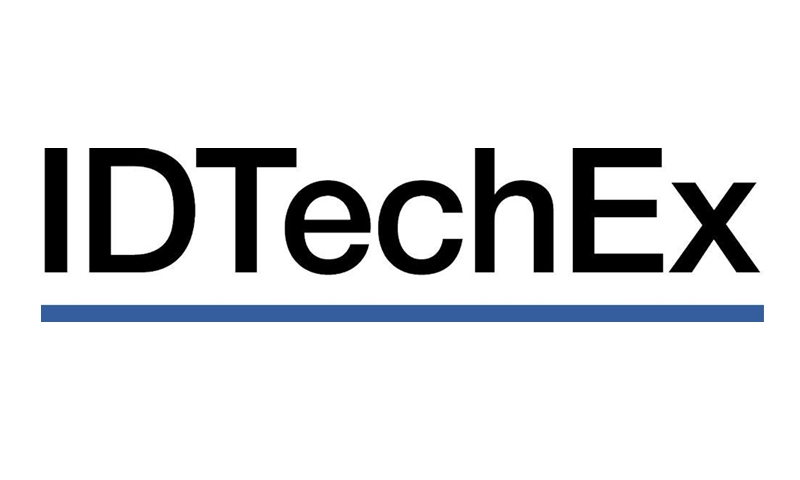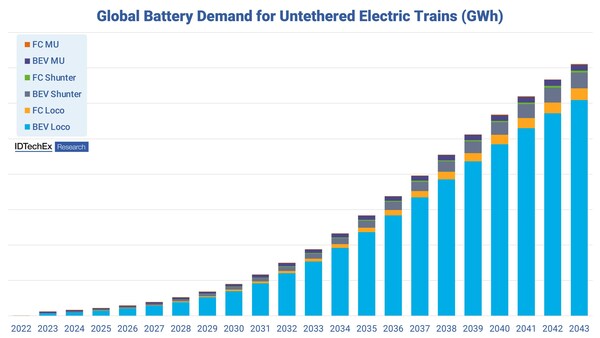
Wireless Trains and Fuel Economy - IDTechEx Explores the Potential Behind Electric and Zero-Emission Trains
Published by Todd Bush on April 26, 2024
BOSTON, April 26, 2024 /PRNewswire/ -- Trains that could travel to more tucked-away parts of the country with zero emissions are an example of the potential behind battery electric (BEV) and fuel cell (FC) trains. The benefits to the environment, alongside businesses removing long-term fuel costs, could make this advancement even more worthwhile.
Fuel economy and the environment

Global battery demand for untethered electric trains (GWh)
>> In Other News: Gearing Up for a Green Highway: Air Products Paves the Way for Hydrogen Transportation in Alberta
Fuel economy is a key driver for BEV and FC trains, as fuels such as diesel used to power trains can be expensive and unsustainable. Businesses within the rail sector are setting their own targets for reducing emissions, with companies such as Deutsche Bahn aiming to be climate neutral by 2040 and to half CO2 emissions by 2030. Many other companies are following suit with their own long-term goals, all of which are contributing to a future of zero-emission rail transport. Environmentally friendly reputations are not the only factor at stake, but financially, companies are set to see investments in electric trains benefitting long-term costs by scrapping the need for diesel.
Battery hybrid trains, which are in use without the need for overhead lines, have already been shown to reduce fuel consumption and are a huge driver for switching to electric. Hybrid trains might be the next step, but it is hoped that trains will be completely electric and will no longer require fuel, increasing the sustainability of rail travel exponentially. Due to the longevity of trains, investing in BEV trains, rather than continuing to buy diesel trains in the coming years could avoid the prolonging of reaching zero-emission in the rail sector and make the future zero-emission goals of companies more achievable. Fuel cell trains will most likely be used less commonly, primarily in colder climates and for longer distances, where battery electric vehicles tend to suffer from range reduction.
Passenger trains will be among the first to become electrified, including long distance as well as intercity, so people can feel better about lowering their carbon footprint with rail travel. In the long term, BEV trains will dominate the demand for batteries in the rail sector.
Physical accessibility
Taking a train right down to the beach might feel closer to being possible as BEV trains will not require the same complex overhead systems as trains in use today. Overhead systems are very expensive, approximately US$1-5 million per mile, and are therefore far more difficult to install in remote areas. Diesel trains can also achieve this, but are not ideal going into a future zero-emission transport world.
The new zero-emission trains will change transport accessibility in places where it is not viable to install overhead infrastructure, either due to cost or geographical factors such as bridges or surrounding water, and people will be able to catch a train to places they couldn't before. BEV and FC trains will introduce the possibility for greater accessibility for those who don't drive or who prefer to travel by train.
In China, electric trains are already popular as short distance trains are much more common, so BEV trains are a great solution to lower emissions across the transport sector as well as supporting lower road emissions. In their report, "Battery Electric & Hydrogen Fuel Cell Trains 2023-2043", IDTechEx predicts the electric trains market to grow 10-fold from 2024 to 2044, forecasting just how successful the introduction of BEV trains could be.
Rail stations could look different in the future, as they will need to massively increase their power connectivity to charge up the trains. Battery electric trains will be far more common as the market grows due to the cost of the hydrogen fuel alternative and the lack of infrastructure to make hydrogen readily available. Despite rail transport only contributing a fairly small portion of global transport emissions, these new and improved trains will help take an extra step towards zero-emission transport. They could change the experience of traveling by train for good.
To find out more about this topic, please see the IDTechEx report "Battery Electric & Hydrogen Fuel Cell Trains 2023-2043" at www.IDTechEx.com/Train. Downloadable sample pages are available for this report.
For the full portfolio of electric vehicle market research from IDTechEx, please visit www.IDTechEx.com/Research/EV.
About IDTechEx
IDTechEx provides trusted independent research on emerging technologies and their markets. Since 1999, we have been helping our clients to understand new technologies, their supply chains, market requirements, opportunities and forecasts. For more information, contact [email protected] or visit www.IDTechEx.com.
SOURCE IDTechEx
Subscribe to the newsletter
Daily decarbonization data and news delivered to your inbox
Follow the money flow of climate, technology, and energy investments to uncover new opportunities and jobs.
Latest issues
-
Shell’s Canada CCS Bet: 650,000 Tons Annually
Inside This Issue 🏭 Shell To Build Carbon Capture And Storage Projects In Canada 🧪 Vortex Energy Highlights 2025 Technical Milestones Across Project Portfolio And Announces Adjournment Of AGM To F...
-
Three Industry Giants Just Aligned on Ammonia
Inside This Issue ⚓ CF Industries, Trafigura And TFG Marine Sign MOU To Advance Low-Carbon Ammonia For Maritime Decarbonisation 🌽 EPA Expects to Finalize 2026-27 Biofuel Blending Rules in Q1 2026 ...
-
What Drillers Hit 140km South of Saskatoon
Inside This Issue 🌱 Indigo to Sell 2.85 Million Tonnes of Carbon Removal to Microsoft, Supporting Soil Health Through Regenerative Agriculture 🏛️ Legislation Would Give Parishes Control Over Carbo...
Company Announcements
-
Brossard, Quebec, January 22, 2026 – TheNewswire - CHARBONE CORPORATION (TSXV: CH; OTCQB: CHHYF; FSE: K47) (“CHARBONE” or the “Company”), a North American producer and distributor specializing in c...
-
BRUSSELS, BELGIUM, January 22, 2026 / -- Methanol-to-Jet (MtJ) could become a major contributor to sustainable aviation fuel (SAF), according to a new report Methanol-to-Jet SAF: Policy, Technoecon...
-
The Gevo North Dakota site is believed to be the largest producer of engineered carbon removal credits and the only ethanol carbon capture and storage project issuing Puro.earth-certified certifica...
-
Chehalis Port Delays Hydrogen Production And Refueling Hub, With Start Now Planned For Spring 2026
Large-scale energy projects are simple to plan on paper, but when it comes to executing them, they are very complex and require great attention to detail. The latest project to be delayed is the Ch...